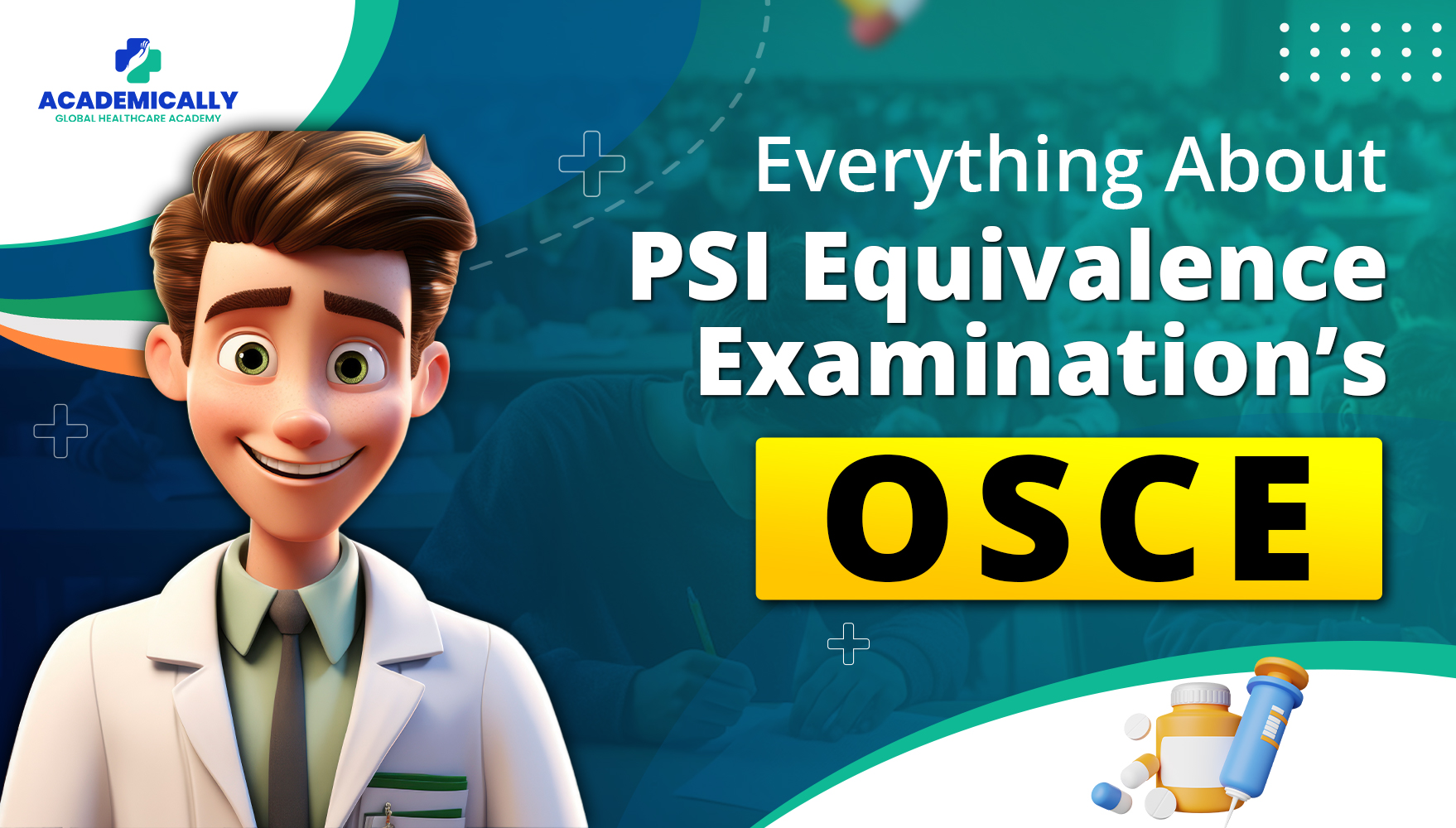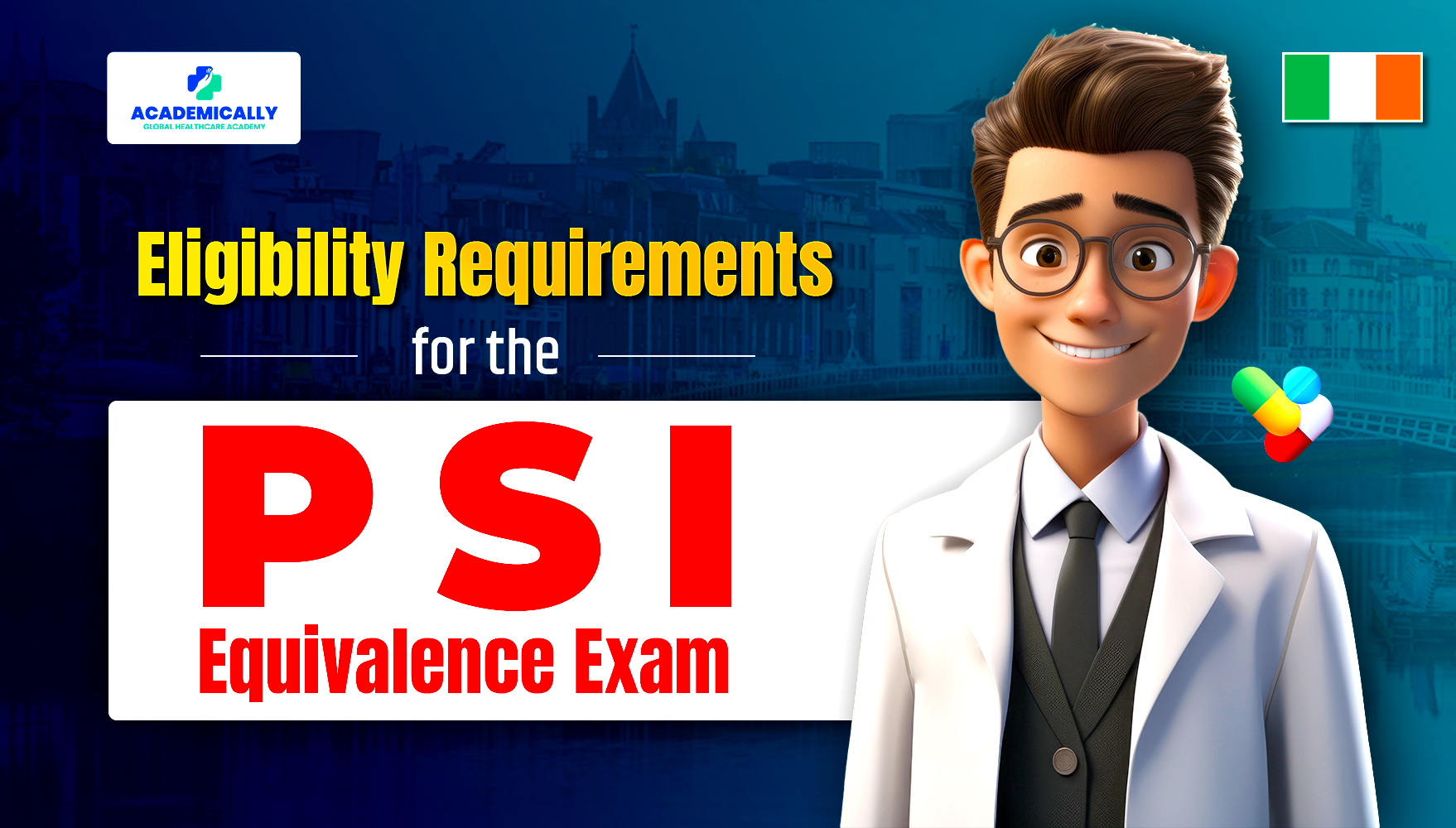About PSI OSCE
The Objective Structured Clinical Examination (OSCE) is the second part of the PSI Equivalence Examination after MCQ for international pharmacy candidates.
It is designed to simulate real-life interactions that pharmacists might have with patients, general practitioners, or other healthcare professionals in community and hospital pharmacy settings.
With eight OSCE stations—comprising six live/interactive stations and two written stations—candidates must be well-prepared to showcase their clinical knowledge, communication skills, and problem-solving abilities. Generally, MCQ and Written OSCE are conducted on Day 1 of the exam, and on Day 2, Verbal OSCEs are conducted.
Candidates can take the OSCE exam from the comfort of their homes. It is a proctored remote exam.
Understanding the PSI OSCE Structure
Each Verbal OSCE station lasts exactly seven minutes. The first minute is a brief familiarisation period during which candidates receive instructions about the station’s focus and scenario. This structure emphasises the importance of being organised and efficient as time passes. The candidate has to utilise the next 6 minutes to understand the scenario with the actor patient and come to a valid clinical conclusion.
Live/Interactive OSCE Stations
The live OSCE stations involve direct interaction with a “patient,” “doctor,” or another actor role-playing a healthcare scenario. An assessor will observe and evaluate the candidate’s performance based on various criteria, including communication skills, clinical decision-making, and professional demeanour.
Key Tips for Success
- Practice Active Listening: Engage fully with the actor, ensuring you understand their concerns or questions before responding.
- Clear Communication: Explain medical terms and instructions in simple, patient-friendly language.
- Empathy and Professionalism: Show empathy towards the patient’s situation while maintaining a professional attitude.
- Master the Questioning Process: What questions to ask in which conditions is an important aspect of OSCE verbal examination.
Example: You will counsel a patient on a new prescription, similar to the scenario demonstrated in many online resources like YouTube videos. You won’t need to take handwritten notes, but you will use the brief familiarisation period to review the provided resources, such as the prescription or patient medical record (PMR). Also, the candidate can refer to the British National Formulary (BNF).
Written OSCE Stations
In contrast, the written OSCE stations require candidates to interpret and respond to clinical scenarios without interacting with actors. These stations might involve analysing a hospital drug chart, identifying prescribing errors, or reviewing drug literature. There are two written OSCE stations of 20 minutes each. Each station can have 3 to 5 subquestions that a candidate should answer under 20 minutes.
Key Tips for Success
- Thorough Reading: Carefully read all provided documents and instructions to ensure you understand the scenario.
- Analytical Thinking: Apply your clinical knowledge to interpret data accurately and provide well-reasoned answers.
- Time Management: Allocate your time wisely to address all parts of the question within the seven-minute limit.
- Example Scenario: Evaluate a hospital drug chart for potential drug omissions or dosage errors, where you'll provide written answers based on your analysis.
Results
The overall pass mark for the OSCE is the average score from all 8 stations. Candidates don't need to pass each station individually. The written stations have a pass mark of 50%. The pass mark for the interactive stations is set using statistical methods approved by external examiners.
Know about how to get a job and visa in Ireland here.
PSI OSCE Syllabus
The PSI syllabus for both MCQ and OSCE are as follows:
1. The Patient
- Role of the Pharmacist
- The ethical obligations of the pharmacist
- Health and illness
- Theory and practice of personal and interpersonal skills
- Principles and methodologies of the social sciences and psychology
- The ideas and approaches of concordance and adherence support in healthcare provision
- Health promotion and disease prevention
- Normal and abnormal bodily function
- Aetiology and epidemiology of diseases
- Symptoms recognition and management
- Disease management and pharmaceutical care planning
- The rationale and evidence-base for complementary therapies
- Drug and substance misuse
- Toxicology and adverse effects of medicines and substances of abuse
2. Healthcare systems and the roles of professionals
- Healthcare systems in Ireland
- The duty of care to the patient and the wider public
- Professional standards and guidelines for practice
- Principles of organisation in the workplace
- Oversight and development of those working in the pharmacy team
- Communication skills relating to multidisciplinary working
- Obligations of pharmacists
- Clinical governance
- Evidence-based policy and practice
- Use of information technology in pharmacy and more widely in health care
- Medicines safety
3. The wider context
- The political and legal framework, requirements and processes relevant to pharmacy in Ireland and within the EU
- The role of public health, health promotion, and health economics, particularly pharmaco-economics
- Scientific, clinical, health services and social services research relevant to pharmacy, translation of evidence into policy and practice
- Occupational and environmental health and safety and the related legal requirements
4. Human and Veterinary Medicines: drug action
- Molecular basis of drug action and the actions of drugs within living systems
- Clinical therapeutic uses of drugs and medicines in people
- Drug absorption, distribution, metabolism and excretion and influences thereon
- Clinical evaluation of new and existing drugs and medicines and post-marketing surveillance
- Prospects for new approaches in therapeutics.
5. Human and Veterinary Medicines: the drug substance
- Sources and purification of substances
- Physico-chemical aspects of drugs and biological systems
- Specifications of substances used in medicine
- Analytical methods
- Prediction of drug properties
- Drug design and discovery
- Cell and molecular biology, including genome
- Biological methods of measuring drug activity and biological standards
6. Human and Veterinary Medicines: the medicinal product
- Sale, supply, administration and monitoring of medicines
- Medicines: schedules of medicines and controlled substances; consumer protection
- Materials used in formulations and devices for the delivery of drugs
- Biopharmaceutics, developmental pharmaceutics, pre-formulation and formulation studies
- Manufacturing and distribution
- Packaging and labelling
- Quality assurance of pharmaceutical products and process
- Microbiological contamination: sources, determination, consequences and control.
- Sterilisation procedures and aseptic procedures in the preparation of pharmaceutical products and medical devices
- Environmental control in manufacturing facilities and in the supply chain
- Degradation of medicines: evaluation and control of biological, chemical and physical degradation
- Immunological, biotechnological and radiopharmaceutical products
- Dressings and other wound management products
- Medical devices: their types, regulation and, particularly, their use for the measurement and maintenance of physiological function or medicine delivery
- Statutes and regulations related to medicines, poisons and controlled substances
Preparation Strategies
- Familiarise with Resources: Get comfortable using clinical resources like the British National Formulary (BNF), Summaries of Product Characteristics (SPCs), and patient medical records (PMRs). Practice retrieving and applying information quickly.
- Mock OSCE Practice: Engage in practice OSCEs, both live and written. Use available online videos and simulations to understand the dynamics of live stations.
- Feedback and Reflection: After each practice session, seek feedback and reflect on areas of improvement. This iterative process will help refine your skills and build confidence.
Final Words
The PSI Equivalence Examination’s OSCE component is a rigorous yet rewarding assessment that tests various competencies for a thriving pharmacy career. Candidates can confidently approach the examination by understanding the structure and requirements of both live and written OSCE stations and diligently preparing through practice and feedback. Remember, each seven-minute station is an opportunity to demonstrate your proficiency and readiness to excel in pharmacy.
If you want to become a pharmacist in Ireland, start preparing today with Academically’s PSI Pharmacy Equivalence Exam (TCQR) and pass the PSI’s Equivalence Exam on the first attempt.
Good luck to all candidates who are thinking of pursuing this journey! With thorough preparation and a strategic approach, success in the PSI OSCE is well within your reach.
Fill out this form if you want more guidance regarding the PSI exam.






